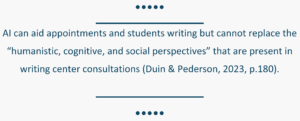UWC: 2024 International Writing Center Association
The University Writing Center (UWC) admin team Dr. Nikki Caswell, director, Dr. Rebecca Johnson, assistant director, and Elizabeth Gagne’, graduate assistant director attended the 2024 International Writing Center Association’s (IWCA) annual conference. The conference, which took place virtually through Whova, was themed around emergent technologies. Specifically, the technologies associated with artificial intelligence (AI). As IWCA stated the conference was “focused on the impact of emergent technologies on writing centers and writing pedagogy.”
Caswell, Johnson, and Gagne’ presented “AI and “The Betty Crocker Effect”: Emphasizing the Human Component of the Writing Center.” This presentation focused on the human aspects associated with how consultants engage with students who step into the UWC space.

Johnson began the presentation by providing background information on the Betty Crocker effect and how academia’s reaction to AI isn’t new, as it has happened with various other emergent technologies, such as the computer, the calculator, the pencil, etc. Johnson sets the foundation for why the humanistic approach is needed when emergent technologies are being utilized in academic spaces.
Caswell followed by connecting the Betty Crocker effect to the UWC and how the UWC is currently handling AI and emergent technologies. Caswell emphasized how the consultants are learning about AI through weekly professional developments (PD) and utilizing these weekly PDs to also help research how AI is used in a specific field of the consultant’s choosing. Caswell highlighted how the UWCs onboarding and training lends to a humanistic approach to consultations with clients (students).

Gagne’ ended the presentation by introducing an activity that the UWC consultants did. This activity had consultants provide feedback on higher order of concerns (HOCs) to a paper similar to the ENGL 1100 Literary Narrative that is common for ENGL 1100 students. The HOCs that consultants focused on where: thesis, audience awareness, organization, development of ideas, and purpose. They then had AI give feedback on the same paper, with focus on the same HOCs. The purpose of running this paper through AI was to have data that the consultants could compare to their own feedback. The overall main purpose of the activity was to understand how consultants provide feedback to students vs. how AI provided feedback to students. The consensus was that AI could provide feedback but that it was generalized and could be applied to any writing assignment. Whereas consultant feedback offered targeted feedback that is personalized to the client.
Overall, Caswell, Johnson, and Gagne’ wanted to acknowledge that the jobs of writing centers and consultants were not in jeopardy of being replaced by AI, but instead can be a space that helps students understand how to use AI effectively.
While attending IWCA, Caswell, Johnson, and Gagne’ also attended sessions on gamification, the GEN-AI taskforce, queer pedagogy, a linguistic justice special interest group, and various other sessions.
